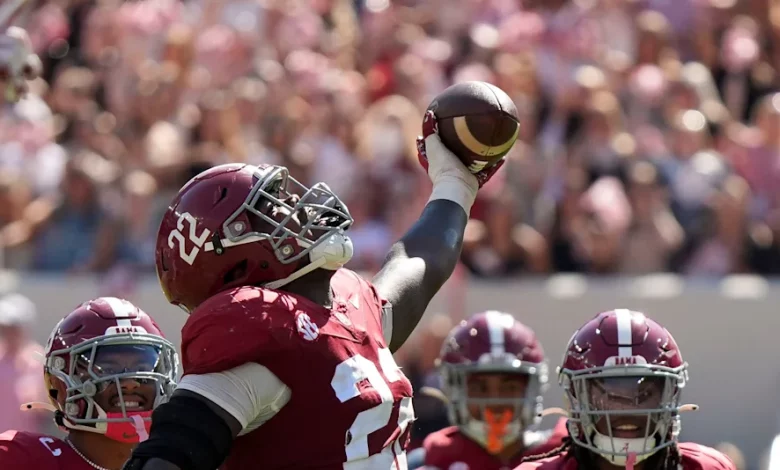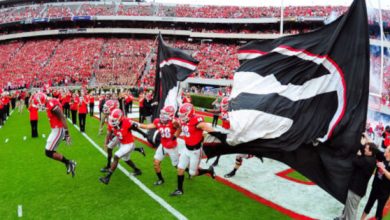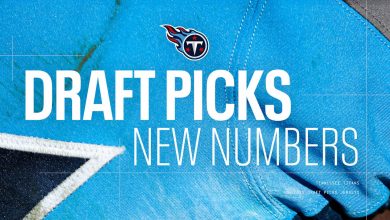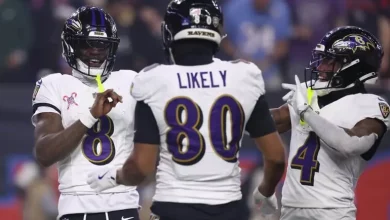‘Unfinished business,’ belief and trust define Alabama football veterans putting off NFL

‘Unfinished business,’ belief and trust define Alabama football veterans putting off NFL
When Tim Keenan III announced he was coming back to Alabama football for his fifth season of eligibility, the Crimson Tide defensive tackle first apologized.
He apologized for how the 2024 season ended, reiterated his goal to win a national championship and pledged his final season at Alabama to doing everything he could to hoist a trophy.
Months later, clad in practice gear, having finished his first week of Crimson Tide spring workouts, Keenan reiterated that same message.
“Well, I mean, of course going 9-4 is not the standard here at the University of Alabama,” Keenan said, remembering how he grew up watching the “dominant” Crimson Tide, and how he will give all he can to make that a reality once again.
For the plethora of Alabama veterans putting off the NFL for another year Keenan’s message is a common one: 2024 wasn’t good enough, but there is trust in Kalen DeBoer, trust in the talent on the roster where 2025 will be better.
“Some unfinished business. Nasty taste in my mouth,” Alabama wide receiver Germie Bernard said. “Just being back with some of the guys and having another shot to win the national championship.”
Why LT Overton came back to Alabama football
LT Overton was one of the players to buy into the notion Keenan was preaching.
Through the first three spring practices, Overton’s message was one of consistency, urging other members of the defensive line to remain consistent and simply play “to the Alabama standard.”
But Overton’s decision to return to the Crimson Tide was a personal one. It was one made because of what it could mean for the next level.
“I feel like I left a lot on the table last year, especially sack wise,” Overton said. “Pressures are cool and all, but you know what the guys really want to see is who’s really making that production. So it was more like I know I was up there, second, first round. But I know I left way more production on the board, and I’m just trying to solidify that spot, that first round.”
What ‘player-led’ Alabama football looks like in 2025
Jam Miller is the veteran now in the Alabama running back room. At least that’s how the Crimson Tide senior views it.
It’s Miller’s time, he says to “step up and be a leader,” to be an encourager to his room and to the rest of his teammates.
“We all know what our one job is,” Miller said. “It was coming back and winning a national championship.”
Bernard views it more as a “player-led” approach, knowing what to expect from DeBoer and his staff, and taking a step forward, knowing what it will take to “withhold” the Alabama standard.
To Keenan, it’s being the best leader he can, centering his mind around a message he repeatedly told himself, told Nick Saban and told whoever would listen: he came to Alabama to win a national championship.
“Really, I put my trust in God. And I believe in the guys here, believe in the coaches here,” Keenan said. “I believe in the system. I really believe in the University of Alabama.”
A flurry of reports from last week resulted in two clear tidbits: (1) a presidential college sports commission is coming; and (2) former Alabama (and Michigan State and LSU and Miami Dolphins) coach Nick Saban will likely serve as a co-chair.
Saban addressed the subject for the first time on Wednesday, in an appearance with ESPN’s Paul Finebaum.
“Well, first of all, I don’t know a lot about the commission,” Saban said. “Secondly, I’m not sure we really need a commission. I think that, you know, a lot of people know exactly what the issues are in college football and exactly what we need to do to fix them. I think the key to the drill is getting people together so that we can move it forward.”
Despite his misgivings about the necessity of a commission, Saban never said he’d decline to serve.
Whatever his role, his agenda is clear: less money paid to the players, more money retained by the schools.
“I’m not opposed to players making money,” Saban said. “I don’t want anybody to think that. I just think the system that we’re, you know, the way it’s going right now, it’s not sustainable and probably not in the best interest of the student-athletes across the board, or the game itself. I think we need to protect the brand and the competitive advantages and disadvantage that are being created right now, and I think we can we can fix all that, but I think we know how to do it, and I think not just me, but a lot of people. We just got to get everybody together to do it.”
As usual, the presumption from Saban and those of his perspective is that college football is broken. From the perspective of the players, who enjoy unprecedented compensation and unlimited restrictions on their mobility, no one is claiming that a fix is needed.
Saban’s predictable position meshes with the perception/reality that the colleges are looking to have it both ways, by: (1) creating a set of rules that restricts player pay and transfer rights; and (2) avoiding making players the employees that they obviously are.
“I don’t think it’s in the interest of the players to necessarily be employees, and I think authentic name, image, and likeness is good for players, but I don’t think pay for play is necessarily what we want,” Saban said.
First, who is Saban to speak on whether anything is in the interests of the players? The players can, and should, speak for themselves.
Second, when Saban says he doesn’t believe “pay for play is necessarily what we want,” who’s the “we”? (It sure as hell ain’t those who would be getting paid to play.)
“I mean, what is college?” Saban said. “You know, we all went to college to create value for our future, and I think we want to keep some semblance of that in terms of guys becoming and developing as people and students and development occur[ing] off the field, as well as developing the ability to play at the next level. So you got to have a system that enhances all three of those.”
That’s fine, if a high percentage of college players make it to the next level. They don’t.
Put simply, college football players are majoring in football. But the placement rate at most schools is ridiculously low. Even at the major pro football factories, most of the players don’t make money in the NFL.
So why not let them get paid while they can, especially when they’re creating millions in value? Why restrict their ability to maximize their income at a time when their earning capacity is high? And why keep them from moving from one program where they won’t be playing to a program where they would be? More than anything else, playing opposed to not playing enhances a player’s ability to play at the next level.
The entire situation sucks for the players. And the fix that will be engineered by the federal government will likely harm their broader interests, not help them.
It won’t matter, if the commission doesn’t fairly represent their interests — and if those who clearly want to help the schools (like Saban) will be able to claim without opposition or scrutiny what they think the players’ best interests are or should be.









